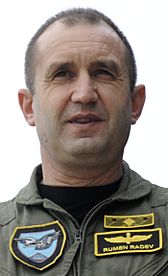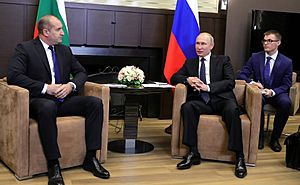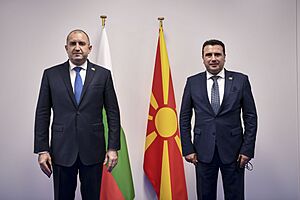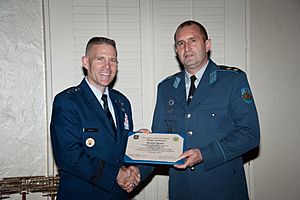Rumen Radev facts for kids
Quick facts for kids
Rumen Radev
|
|
|---|---|
| Румен Радев | |
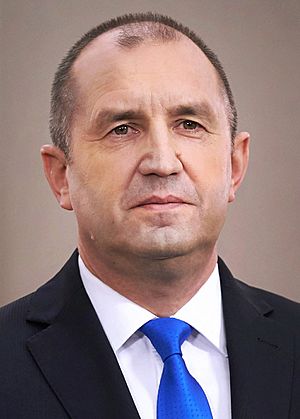
Official portrait, 2018
|
|
| 5th President of Bulgaria | |
| In office 22 January 2017 – 23 January 2026 |
|
| Prime Minister |
See list
Boyko Borisov
Ognyan Gerdzhikov Boyko Borisov Stefan Yanev Kiril Petkov Galab Donev Nikolai Denkov Dimitar Glavchev Rosen Zhelyazkov |
| Vice President | Iliana Iotova |
| Preceded by | Rosen Plevneliev |
| Succeeded by | Iliana Iotova |
| Personal details | |
| Born |
Rumen Georgiev Radev
18 June 1963 Dimitrovgrad, PR Bulgaria |
| Political party | Independent |
| Other political affiliations |
BKP (1985–1990) |
| Spouses |
Ginka Radeva
(m. 1996; div. 2014)Desislava Radeva
(m. 2016) |
| Children | 2 |
| Education |
|
| Military service | |
| Allegiance |
|
| Branch/service | |
| Years of service | 1987–2017 |
| Rank | Major general |
Rumen Georgiev Radev (born on 18 June 1963) is a Bulgarian politician and a former Bulgarian Air Force major general. He served as the fifth president of Bulgaria from 2017 until his resignation on 23 January 2026. He was the first president to resign in Bulgaria's modern history since 1990.
Before becoming president, Radev was a high-ranking commander in the Bulgarian Air Force. He won the 2016 presidential election as an independent candidate. He was supported by the Bulgarian Socialist Party. He won a second term in the 2021 election with a large majority of the votes.
Contents
- Learning and Military Service
- President of Bulgaria (2017-2026)
- Bulgaria's Place in the World
- Public Opinion
- Family and Personal Life
- Military Achievements
- Honours
- See also
Learning and Military Service
Rumen Radev was born in Dimitrovgrad, Bulgaria, on 18 June 1963. He was a very bright student, graduating from a mathematical school in Haskovo with top honors in 1982. He then attended the Georgi Benkovski Bulgarian Air Force University, graduating as the best student in 1987.
Radev continued his education in the United States. In 1992, he graduated from the US Air Force Squadron Officer School. He also earned a Master of Strategic Studies with honors from the Air University in 2003. He holds a special degree in military science, focusing on improving pilot training and air combat simulations.
President of Bulgaria (2017-2026)
In August 2016, Radev was nominated as a candidate for the November 2016 presidential election. He ran as an independent candidate. In the first round of the election, Radev received the most votes. He then won the second round on 13 November, becoming president.
On 1 February 2021, Radev announced he would seek a second term with his running mate, Iliana Iotova. Many political parties supported his re-election. He won the first round of the election on 14 November 2021. In the second round, he won with 66.7% of the votes. He began his second term as president on 22 January 2022.
Working with Prime Minister Borisov
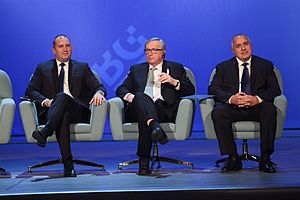
During his presidency, Radev often disagreed with Prime Minister Boyko Borisov. Radev believed there were problems with fairness in the government. He also thought Borisov's leadership style was not good for the country. Radev used his power to veto many laws proposed by Borisov's party.
Borisov, in turn, said Radev was making it harder for the government to do its job. He also accused Radev of supporting other political parties during elections.
Disagreement over F-16 Jets
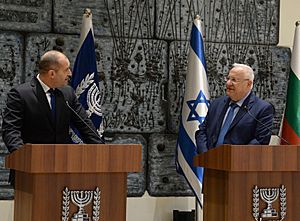
In June 2019, Radev disagreed with a government plan to buy 16 F-16 fighter jets from the United States. He thought the deal was too expensive and that the jets were not good enough for the price. As a former pilot, he believed the deal was not in Bulgaria's best interest. However, the parliament approved the deal despite his concerns.
Concerns about a Legal Appointment
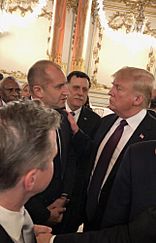
In November 2019, Radev refused to approve the appointment of Ivan Geshev as Chief Public Prosecutor. Radev felt that the selection process was not open enough. He believed that only government-linked groups supported the candidate, not a wide range of citizens. This led to a lack of public trust in the appointment. Even though Radev had to sign the decree eventually, he called for changes to Bulgaria's constitution to improve such processes.
Strong Disagreement with the Government
On 4 February 2020, Radev publicly stated his strong disagreement with Borisov's government. He felt there were serious problems in how the country was being run. He also believed there was a lack of effort to improve fairness and justice. Borisov responded by saying Radev was trying to take too much power.
COVID-19 Pandemic Response
When the COVID-19 pandemic in Bulgaria began, Radev and Borisov's government tried to work together. However, their disagreements soon returned. Radev disagreed with some of the government's new laws related to the pandemic. He particularly opposed a part of a law that would have fined people for spreading "false information." He also disagreed with a part that would have controlled prices of essential goods.
Radev continued to criticize the government's handling of the health crisis. He believed they were not managing the situation well. The government, in turn, accused Radev of making things harder during a difficult time.
Public Protests and Advisors
In July 2020, there were public disagreements involving some of the president's advisors. This led to large public protests against the government. Radev openly supported these protests. He made a televised speech, asking the government and the chief prosecutor to resign.
Elections and Caretaker Governments
After the April 2021 elections, Radev played a key role in forming new governments. Because no single party won enough votes to form a government easily, Radev appointed several "caretaker cabinets." These temporary governments managed the country until a stable government could be formed. Stefan Yanev and Galab Donev were among the caretaker prime ministers he appointed. Radev praised these caretaker governments for trying to ensure fair elections and address national issues.
Re-election and Second Term
Radev ran for re-election in 2021, promising to continue working for a "stronger state." He was supported by several major parties. He won the election in November 2021, securing his second term as president. During his campaign, he discussed important topics like Bulgaria's relationship with other countries. He officially began his second term on 22 January 2022.
Working with the Petkov Government
After the 2021 elections, Radev supported the formation of a new government led by Kiril Petkov. Petkov and Assen Vassilev had previously served in a caretaker government appointed by Radev. Radev encouraged the new government to improve the political system and address national challenges.
However, Radev soon became critical of the Petkov government. He disagreed with their approach to North Macedonia and some of their decisions regarding state companies.
Changes in Legal Leadership
Radev also played a role in the removal of General Prosecutor Ivan Geshev. He had previously expressed concerns about Geshev's appointment. After a vote in the Supreme Judicial Council, Radev signed the decree to remove Geshev from his position in June 2023.
Later Years of Presidency (2023-2026)
During the last years of his presidency, Radev continued to be an active voice in Bulgarian politics. He often used his power to veto laws he disagreed with. He also challenged some laws in the Constitutional Court. These actions showed his commitment to his vision for Bulgaria.
He also spoke out about national holidays and historical memory. He supported keeping 3 March as Bulgaria's Liberation Day. This led to public discussions about national identity.
Government Changes and Resignation
The political situation in Bulgaria remained complex, with several governments forming and resigning. Radev continued to appoint caretaker governments when stable coalitions could not be formed.
On 19 January 2026, Rumen Radev announced his intention to resign as President. He submitted his resignation to the Constitutional Court on 20 January. The Constitutional Court formally accepted his resignation on 23 January 2026, marking the end of his time as President of Bulgaria.
Bulgaria's Place in the World
Relations with Russia and the Ukraine War
Radev had clear views on Bulgaria's relationship with Russia and the conflict in Ukraine. In 2017, he called for an end to European Union sanctions against Russia. However, he also stated that Russia's actions in Crimea were against international law.
Radev also expressed concerns about Ukraine joining NATO too quickly. He believed such decisions needed careful thought and agreement from all NATO members. He met with Ukrainian President Volodymyr Zelensky in July 2023. During this meeting, Radev expressed sympathy for Ukraine. He called for negotiations to de-escalate the situation.
Relations with Turkey
Radev considered Turkey an important neighbor and partner for Bulgaria. However, he also stressed that Turkey must respect Bulgaria's internal political processes. In 2017, he raised concerns about what he saw as outside involvement in Bulgaria's parliamentary election. He later met with Turkish President Recep Tayyip Erdoğan to discuss cooperation.
Relations with North Macedonia
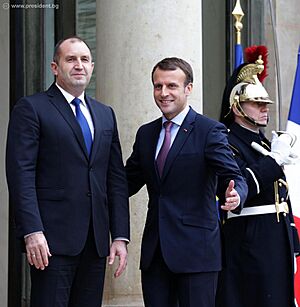
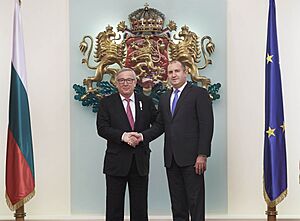
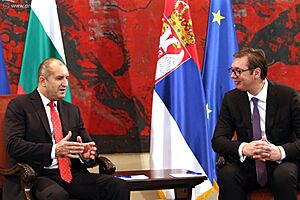
Radev was cautious about Republic of North Macedonia joining the European Union. He believed that North Macedonia needed to protect the rights of Bulgarians living there. He also asked for more action to prevent hate speech against Bulgarians in North Macedonia. He emphasized that North Macedonia should follow existing agreements with Bulgaria.
Other International Activities
Radev also commented on other global events. He criticized missile strikes in Syria in 2018, calling for more dialogue instead of weapons. He also expressed disappointment when Austria and the Netherlands blocked Bulgaria from joining the Schengen Area in 2022. He believed Bulgaria was ready to join and that the decision was unfair.
Public Opinion
Radev generally had good public support throughout his presidency. He was elected with about 60% of the vote in 2016. His approval ratings remained high for several years, sometimes reaching 67%. Even when his popularity dropped, he was often still seen as one of Bulgaria's most liked politicians. He started his second term with an approval rating of 58.5%. While his approval ratings saw some ups and downs, they recovered to around 40% before his resignation in January 2026.
Family and Personal Life
Rumen Radev joined a political party in the 1980s, but he left it in 1990. This was because a new law prevented military members from being part of political parties. He has been an independent politician ever since.
Radev has two children from his first marriage: a daughter, Darina (born in 2001), and a son, Georgi (born in 2003). He later married Desislava Gencheva in 2016. Besides Bulgarian, Radev can speak Russian, German, and English. He is a member of the Bulgarian Orthodox Church and supports religious education in schools. He also admired Pope Francis.
Military Achievements
Radev had a distinguished career in the Bulgarian Air Force. He started as a junior pilot in 1987. Over the years, he rose through the ranks, becoming a major general in 2014. From 2014 to 2017, he served as the commander of the Bulgarian Air Force.
He was a skilled pilot, flying various types of fighter jets like the MiG-29. He had over 1400 hours of flight experience. In 2014, he even performed impressive aerial maneuvers at an air show. He received several awards for his loyal service.
Military Ranks Held
- 1987: Lieutenant
- 1989: Senior lieutenant
- 1994: Captain
- 1997: Major
- 1999: Lieutenant colonel
- 2002: Colonel
- 2007: Brigadier general
- 2014: Major general
- 2017: General (Commander-In-Chief)
Honours
National Honours
 Bulgaria : Grand Master of the Order of the Balkan Mountains
Bulgaria : Grand Master of the Order of the Balkan Mountains
 Bulgaria : Grand Master of the Order of Saints Cyril and Methodius
Bulgaria : Grand Master of the Order of Saints Cyril and Methodius Bulgaria : Grand Master of the Order of Civil Merit
Bulgaria : Grand Master of the Order of Civil Merit Bulgaria : Grand Master of the Order of Military Merit
Bulgaria : Grand Master of the Order of Military Merit Bulgaria : Grand Master of the Order of the Madara Horseman
Bulgaria : Grand Master of the Order of the Madara Horseman
Foreign Honours
 Greece: Grand Cross of the Order of the Redeemer (2017)
Greece: Grand Cross of the Order of the Redeemer (2017) Italy: Knight Grand Cross with Collar of the Order of Merit of the Italian Republic (10 April 2024)
Italy: Knight Grand Cross with Collar of the Order of Merit of the Italian Republic (10 April 2024) Malta : Companions of Honour of the National Order of Merit (5 February 2018)
Malta : Companions of Honour of the National Order of Merit (5 February 2018) Portugal:
Portugal:
- Grand Cross of the Order of Aviz (30 January 2019)
- Grand Collar of the Order of Prince Henry (12 April 2022)
 Sovereign Military Order of Malta: Collar of the Order pro Merito Melitensi (13 December 2019)
Sovereign Military Order of Malta: Collar of the Order pro Merito Melitensi (13 December 2019)
See also
 In Spanish: Rumen Radev para niños
In Spanish: Rumen Radev para niños
 | Selma Burke |
 | Pauline Powell Burns |
 | Frederick J. Brown |
 | Robert Blackburn |


